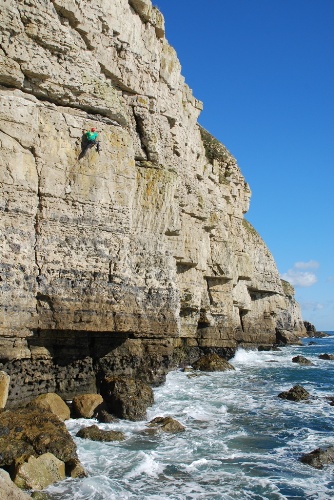Rock climbing

Dorset has some excellent venues for climbing with many areas with good quality limestone rock. The cliffs of Dorset provide a dramatic setting with fantastic views. Portland is best known amongst climbers as one of the most popular sport rock climbing areas in the South West of England. It has over 1000 routes, of varying grades, in many different areas on the Island. Near Swanage there is both traditional and sport climbing.
In an emergency:
- Call 999 and ask for the Coastguard
What do I need?
For climbing you need the correct climbing gear for the type of climbing you are intending to carry out. If you have the right gear then you can use the iCoast map to find out the location of all the climbing locations in Dorset. If you are a novice or fancy having a go then find out the different climbing tuition centres on iCoast map.
"The British Mountaineering Council recognises that climbing or mountaineering are activities with a danger of personal injury or death. Participants in these activities should be aware of these risks and be responsible for their own actions and involvement."
When is the best time to do it?
Climbing can be done all year round on the Dorset coast and many climbing courses run all year round. Some of the climbing areas require knowledge on the tide conditions and its always good to check out the weather. Paths to get to the climbing area can be dangerous during wet conditions and care is always needed by the cliffs as falling rock or land slides can happen at any time and without warning.
Planning your trip
What to look out for
Climbing on the Dorset coast can offer fantastic opportunities to see the amazing world class geology and get up close to the wildlife such as the peregrines on Portland, puffins at Swanage and seals, and dolphins close by in the sea.
The British Mountaineering Council have a code of conduct for climbers at the crag:
Access - Check the Regional Access Database (RAD) on www.thebmc.co.uk for the latest access information
Parking - Park carefully – avoid gateways and driveways
Footpaths - Keep to established paths – leave gates as you find them
Risk Climbing can be dangerous – accept the risks and be aware of other people around you
Respect Groups and individuals – respect the rock, local climbing ethics and other people
Wildlife - Do not disturb livestock, wildlife or cliff vegetation; respect seasonal bird nesting restrictions
Dogs - Keep dogs under control at all times; don’t let your dog chase sheep or disturb wildlife
Litter - ‘Leave no trace’ – take all litter home with you
Toilets - Don’t make a mess – bury your waste
Economy - Do everything you can to support the rural economy – shop locally
Watch out for the environment
- Do not climb in any Restricted Areas and avoid walking under and leaving equipment close to bird restricted areas - In sport climbing areas the first bolts at each climb in the restricted areas are tagged to help climbers identify the restricted areas. Climbing in these areas can lead to the birds failing to breed.
- Take all rubbish home - Find out more about Marine litter in Dorset.
- Help to protect rare plants by minimising disturbance to cliff face vegetation. In particular, do not garden routes (remove plant material from the cliff face). Also avoid abseiling over the cliff tops as this can cause fragile cliff top plants, such as Portland Sea Lavender, to become dislodged and their cliff habitat damaged or destroyed.
- Report live strandings of cetaceans, and injured/entangled marine mammals to British Divers Marine Life Rescue (BDMLR) on 01825 765546 (24 hours). Report all other live injured or entangled animals to RSPCA 08705 555999
Watch out for other users
Many of the popular climbing areas on Portland are close to residential areas. Please park considerately in these areas without blocking drives, parking spaces or garages. Find out the public car parks on iCoast map.
Staying Safe:
- Always tell somebody responsible where you are going and when you will be back. They will be able to raise the alarm by calling 999 and asking for the Coastguard if they get worried when you are not back on time.
- Check the weather and if needed the tide times to avoid being caught out
- Be sun smart
-
- Always wear SPF factor 30 and above waterproof sun cream. Reapply frequently.
- Drink plenty of fluids as you dehydrate faster while exercising.
- Consider taking a rest and seeking shade during the hottest part of the day.




